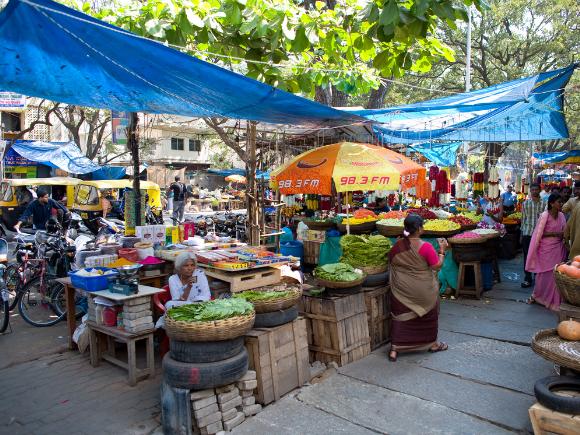Goodbye Gandhi Bazaar: what do we destroy when we demolish illegal structures?
A hundred-year-old street market in Bangalore was demolished in the dead of night last month. The colourful stalls of vendors spilling out onto the streets were illegal encroachments, but how much history and local colour is lost by enforcing the law now after so many years of peaceful coexistence?
Shilpa Rao, 7 February 2012
Source: http://globalurbanist.com/2012/02/07/goodbye-gandhi-bazaar

Some of the fruit and vegetable stalls that occupied the footpath of the Gandhi Bazaar in Bangalore until last month, when the Greater Bangalore Municipal Corporation ordered its demolition overnight. Photo: Charles Haynes (Flickr: haynes)
What are the memories that stay with you when you first visit a city? Sure, the restaurants, nightclubs, clean and pristine public spaces, malls, the highways, the celebrity sightings etc. are fantastic and they enhance a tourist's experience of a culture in innumerable and valuable ways.
But often the memories that we really cherish and share with our kin or on Facebook are much less glamourous but priceless nevertheless. An exquisitely flavoured kaati roll which cost less than a dollar, a runaway-price Fendi knock-off bought on the street, the colours of a bustling local farmer's market, the sights and smells of city trade on the eve of a festival.
These are moments which allow us to experience a city's quintessential indigenous character in a way that a mall, a club or a highway never could. For me, a city's historical local shopping markets are one such asset which creates an ecosystem of entertainment, commerce and convenience which not only serves residents well, but over time builds collective memory and local character.
But in a city where the old is constantly making way for the new, how do we ensure that our institutions first of all acknowledge these assets and then protect them?But in a city where the old is constantly making way for the new, how do we ensure that our institutions first of all acknowledge these assets and then protect them? And how do we do so without endangering necessary change?
At midnight on the 24th of January, the Greater Bangalore Municipal Corporation (Bruhat Bengaluru Mahanagara Palike, or BBMP) erased one such popular landmark in Bangalore: the Gandhi Bazaar. The bazaar is over a hundred years old, home to fresh fruits, flowers and vegetable vendors and some of the most delicious local fast food joints.
In less than an hour, in the dead of the night, the corporation carried out an anti-encroachment drive and evicted all vendors and street hawkers who plied their trade on both sides of the main road. The reasons given were that most of the encroachments were illegal and getting in the way of pedestrians and traffic. The cleared footpaths and adjoining roadway will now make room for easy movement of traffic and more parking slots. The municipal corporation has also promised to provide 'alternative' commercial space for the vendors as close as possible to the market.
A hundred years of history gone for good?
Two days after the eviction, I visited the area to pay my respects to the bazaar and get some answers. I expected to see the vendors back in action after having paid off the municipal authorities their standard quota of bribes. But not this time. I could sense some permanency in this particular eviction.
A dharna (protest) was being staged by the vendors, supported by a politician from an opposition party. A few BBMP officials hung around the area trying not to be spotted by the media. The press was milling about photographing the trashed stalls and the debris. The formal licensed brick-and-mortar shop keepers as well as residents were indifferent to this entire process, going about their daily business as usual.
In my conversation with a BBMP official stationed in the area, I learned that only 100 licenses have been given out to hawkers in the area, and that there are now over 300 vendors stationed on the footpaths. Even the ones with a license have been given a six-by-four-foot area, which they have expanded overtime illegally causing footpaths and the roads to be choked.
'They had it coming', he said, 'they had received several warnings but they never obeyed.' The protesters responded unequivocally, 'we had absolutely no warning, they have robbed us of everything in one night.' A shopkeeper commented, 'we feel really sorry for them, they have suffered millions of rupees in losses, some of them have been doing business here over three generations covering a hundred years.'
One resident lamented, 'we feel bad too, we get the best prices for fruits and vegetables here.' Another resident was happy, 'now there's room for us to walk and park our cars, parking was always such a problem here.' I was a little taken aback that neither local residents nor surrounding shopkeepers were interested in participating in the dharna even those that expressed genuine concern.
Read more: http://globalurbanist.com/2012/02/07/goodbye-gandhi-bazaar








